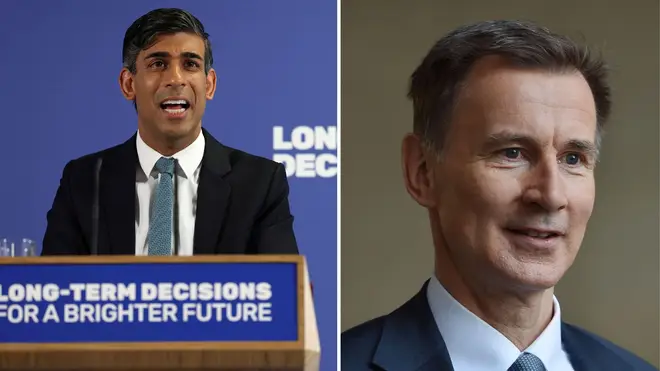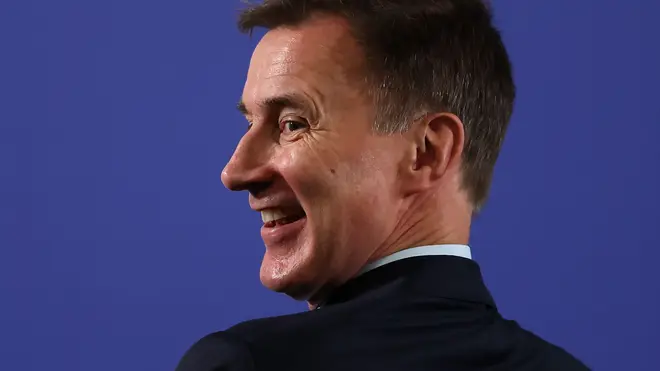
Nick Abbot 10pm - 1am
20 November 2023, 11:09 | Updated: 20 November 2023, 14:43

Rishi Sunak has teased "careful" tax cuts in a speech ahead of the Autumn Statement, saying there are no "fairytale" answers to fix the economy.
The Prime Minister hailed having hit his pledge of halving inflation, saying it is now time to "look forward towards the future economy that we want to build".
Speaking at a North London college on Monday, he said reaching the inflation goal showed that "when we make a major economic commitment, we will deliver it".
"One that believes the private sector grows the economy and, where government has a role, it must be limited," he said.
"One that believes in cutting taxes, but doing so carefully and sustainably.
"And one that is ambitious about the unprecedented opportunities for this country from the new wave of technology."
He refused to be drawn on which taxes would be cut, but told LBC that the 'biggest single tax cut' had already happened with inflation coming down and the benefits were already being felt.
Read more: Jeremy Hunt to 'face red wall revolt' if he cuts inheritance tax while squeezing benefits

Sunak promises tax cuts ahead of crunch autumn statement
Mr Sunak said he was taking "five long-term decisions" for the economy and public finances.
They would focus on reducing debt, cutting tax, building sustainable energy, backing British businesses and delivering world-class education.
He contrasted his approach to the public finances with that of Labour and his predecessor Liz Truss.
He claimed Sir Keir Starmer and Rachel Reeves wanted to continue the "big government, big spending approach" of the pandemic, with up to £28 billion of borrowing a year for Labour's green plans.
"This makes the same economic mistake as last year's mini-budget, blowing tens of billions of pounds on unfunded spending is just as dangerous as blowing tens of billions of pounds on unfunded tax cuts."

It comes amid hopes that Chancellor Jeremy Hunt will cut income tax or national insurance in the upcoming financial statement.
He is also said to be seeking more money from savers in a bid to meet the UK's borrowing costs.
Mr Hunt is expected to raise targets for National Savings & Investments (NS&I) after an increase in interest rates led to a surge in deposits.
NS&I products are 100 per cent backed by the Treasury, which means those who invest are effectively funding the government.
The net funding target was previously raised from £6 billion to £7.5 billion in March to help meet borrowing requirements.
Meanwhile, Bank of England data showed that £7.7bn flowed into NS&I deposits in September alone.
A market-leading bond was then pulled from sale last month after a surge in demand in just five weeks.

Watch Again: Nick Ferrari is joined by Exchequer Secretary to the Treasury Gareth Davies | 20/11/23
It comes after Treasury Minister Gareth Davies told LBC's Nick Ferrari at Breakfast the Chancellor's plan will be focused on "boosting growth".
“What you’ll see this week in the Autumn Statement is a focus on boosting growth. Through two main areas,” Mr Davies said.
He told Nick one of the areas was “boosting business investment”, which would “create jobs and greater prosperity around the country".
Mr Davies added: "Let me be really clear. We have no plans whatsoever to change the winter fuel payments. We've always stood by pensioners.
"We introduced the triple lock, which has brought about 200,000 pensioners out of absolute poverty and we're sticking by the most vulnerable in our society with a range of measures, not least cost of living payments. We've raised the national living wage."
Speaking to LBC on Sunday, Mr Hunt said it was time to "put aside defeatism" and admitted he wants to see lower taxes.
"When it comes to tax, we will be responsible, and having halved inflation, which is what the Prime Minister pledged to do, we're not going to do anything that suddenly means it takes off again," he said.
"We've got to be really careful. And we will continue to be responsible.
"But there is a dividing line between us and Labour because we do believe that low taxes are important to a growing economy."
Tougher benefits rules
Mr Hunt is set to announce that benefits claimants who fail to engage with their job centre or reject work offered to them will have their claim closed after six months.
This means that they will have to register again if they want to keep receiving benefits, and during this time will lose access to extras such as free prescriptions and legal aid.
Additionally, measures set to be put in place in late 2024 will mean welfare claimants who fail to find work after 18 months will have to undertake a work experience placement.
£1,000 off energy bills for agreeing to pylons
LBC has learned that the government plans to offer households £1,000 for agreeing to have pylons installed in their area.
People will also be offered money for local projects such as GP services and new roads if they accept the new pylons.
Inheritance Tax cuts
The Treasury is reportedly planning to cut inheritance tax by half and lower the tax for small businesses.
Inheritance tax is currently charged at 40% on estates worth over £325,000, with an extra £175,000 for estates passed down to relatives.
The Treasury is said to be planning to cut the rate to 30% and increasing the threshold at which it is charged.
Council Tax to increase by £120
Another measure set to be announced in the Autumn Statement is a £120 rise in Council Tax for the average family.
Mr Hunt will state that councils will be able to raise their Council Tax rates by up to 5% from April.
Fuel Duty increase
The Chancellor is reportedly under pressure to raise fuel duty after it was cut by 5p in 2022.
It is thought that the tax could be raised by at least 2p, to make up the £5 billion that was lost due to the cut.
First-time buyer help
The government is considering extending the Mortgage Guarantee Scheme, to help more first-time buyers get a loan with a 5% deposit.
The scheme was extended last year and is set to end in December 2023, but it could be extended for another year.
ISA reforms
A shake-up of the ISA system is another measure thought to be on the cards.
This could include a simplification of the system, a new ISA with a higher allowance, and the scrappage of the single ISA allowance.
Stamp Duty changes
Homeowners who make their houses more energy efficient within two years of purchasing could get a partial Stamp Duty rebate, under new plans set to be announced in the Autumn statement.
The threshold at which people start paying stamp duty could also increase.